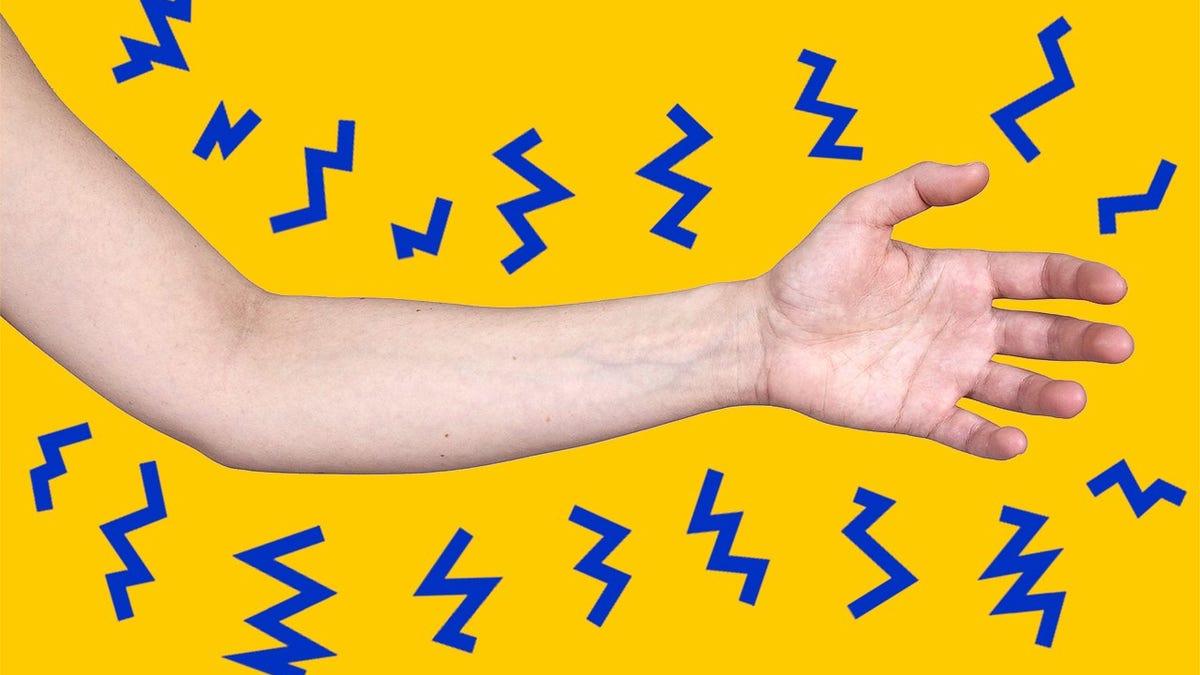
The sensation of a foot, leg, or arm “falling asleep” is a familiar one. We’ve all ended up at some point with a slightly numb limb that needs to be shaken awake—maybe you’re a habitual leg-crosser, or always end up sleeping on top of your arm. While the numbness or tingly feeling that ensues can sometimes be alarming (especially when it takes a while to go away), most of the time, it’s really nothing to worry about.
When a body part becomes temporarily numb, it’s usually because you’ve been putting too much pressure on a nerve. Nerves work like an electrical wire, sending signals from the brain out to parts of your body, and back, Glenna Tolbert, M.D., assistant clinical professor at the David Geffen School of Medicine at UCLA and founder and medical director of neurological and orthopedic rehab center Tolbert Rehab, tells SELF. When there’s pressure on a nerve for an extended period of time, the signals can’t travel as efficiently. It’s kind of like putting a kink in a hose.
In addition to annoying numbness, pressure on a nerve can also cause the tingly, slightly painful sensation of “pins and needles.” “The nerve becomes hypersensitive after being pressed on,” and becomes irritated, Orly Avitzur, M.D., editor in chief of Neurology Now, the American Academy of Neurology patient magazine, and fellow of the AAN, tells SELF.
Many of the nerves in your arms and legs are superficial, or close to the surface of your skin, “If you look at your wrist, you can see the tendons and blood vessels. The nerves are running there, too,” Tolbert explains. Some nerves in your arms and legs are actually very easy to compress simply by pressing on them.
More From SELF
“One of the common nerves impacted for women is the nerve that sits outside the knee, the peroneal nerve,” Avitzur says. “It happens from crossing one leg over another.” Leaning on your arm, or sitting on your foot are also common triggers for a body-part siesta. It’s all totally normal and should go away within 30 seconds or so after removing the pressure.
A more alarming situation is when you wake up in the middle of the night and your arm feels completely paralyzed. The first time this happens to you, you might actually be convinced it is. But there’s no need to panic, Tolbert says. As long as sensation and strength come back after a few seconds of shaking it out (with some help from the non-dead arm), you’re fine. The longer you’ve been laying on it, though, the longer it’ll take for sensation to return.
“If you laid like that for days, you’re not going to have the oxygen flowing to the blood, in addition to the fact that the nerve is compromised,” which could be problematic, Tolbert says. It’s not super common, but it does happen. There’s a condition called Saturday Night Palsy that can happen if you’ve been drinking, pass out on your arm or hand, and your body’s too sloshed to wake itself up when it starts to get numb. There’s also Honeymoon Palsy, which is when your bedmate is the one sleeping on your arm all night. Both can cause long-term numbness, and take up to a few months to recover from, depending upon how long the nerve was compressed.
As long as the structure of the nerve is intact, and the myelin coating (the protective layer of fat and protein that protects the nerve) is not compromised, there shouldn’t be any permanent damage. “If, for example, you have a stab or gunshot wound and the nerve is cut, then that’s very serious,” Tobert says. “Now you’ve disturbed the architecture of the nerve. But as long as the architecture is not disturbed, then it has a good prognosis.”
If you ever experience numbness or tingling and it doesn’t resolve after a few minutes, or if it happens randomly, call your doctor. If it happens in the thumb, index, middle, and lower half of the ring finger, it could be carpal tunnel syndrome. Certain conditions, like diabetes or a vitamin B12 deficiency, can make you more prone to nerve problems, and should be addressed to prevent lasting damage.







































